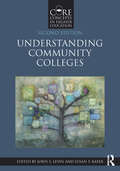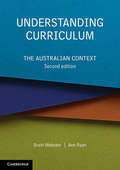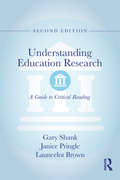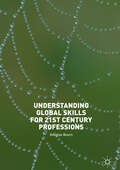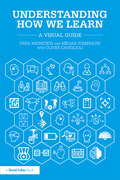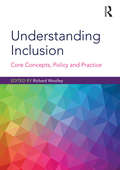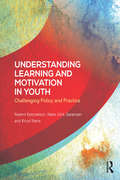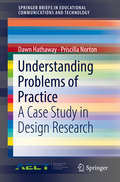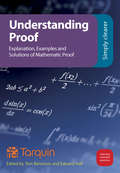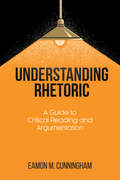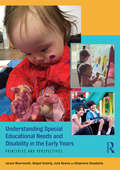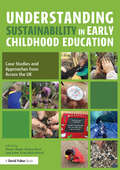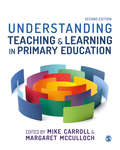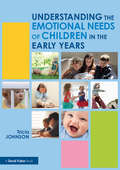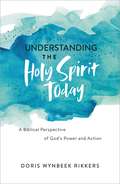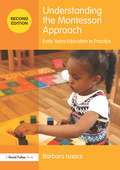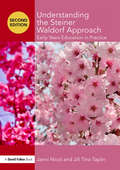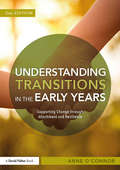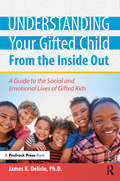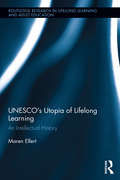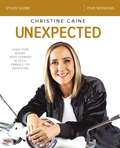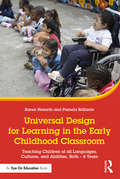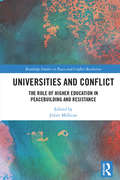- Table View
- List View
Understanding Community Colleges (Core Concepts in Higher Education)
by John S. Levin and Susan T. KaterUnderstanding Community Colleges provides a critical examination of contemporary issues and practices and policy of community colleges. This contributed volume brings together highly respected scholars as well as new scholars for a comprehensive analysis of the community college landscape, including management and governance, finance, student demographics and development, teaching and learning, policy, faculty, and workforce development. At the end of each chapter, the "Questions for Discussion" section helps to bridge the gap between research and practice. Written for students enrolled in higher education and community college graduate programs, as well as social sciences scholars, this provocative new edition covers the latest developments in the field, including trends in enrollment, developmental education, student services, funding, and shared governance.
Understanding Curriculum: The Australian Context
by Scott Webster Ann RyanUnderstanding Curriculum is a critical introduction to contemporary curriculum theory and practice. Substantially revised, the second edition includes more detailed consideration of the ideological underpinnings of curriculum development, features new chapters on assessment and reporting, and updated vignettes and extracts. These features, combined with all the elements of the previous edition, encourages readers to reflect on how curriculum theory can inform and enhance classroom practice.
Understanding Education Research: A Guide to Critical Reading
by Gary Shank Janice Pringle Launcelot BrownUnderstanding Education Research, 2nd Edition is designed to help students learn to read educational research articles carefully, systematically, and critically. Readers will learn how to categorize titles, decode abstracts, find research questions, characterize research arguments, break down methods and procedures, explore references, apply analysis strategies, and interpret findings. This textbook and quick reference guide allows students to easily develop the skills they need to become research literate and the 2nd edition has been updated throughout to offer simple guidelines for qualitative, quantitative, and statistical approaches and up-to-date information on complex and confusing methodologies.
Understanding Global Skills for 21st Century Professions
by Douglas BournThis book highlights the increasing need for people who will be working in professions such as teaching, health, engineering and business management to have the skills for living and working in a global society. Globalisation and the challenges resulting from recent political events in Europe and North America have given rise to a need for training and further and higher education programmes to address the skills young people all need to effectively engage in the current global society. Reviewing the range of theories and debates surrounding skills for the twenty-first century, the author suggests there is a need to directly address the real-world issues of today and move beyond abstract concepts such as team work, critical thinking and problem solving, as important as these concepts are. The author proposes a new framework for global skills using examples from international and national policy-makers and evidence from further and higher educational programmes and training courses. This pioneering yet practical book will be of value to students and scholars of global education as well as practitioners and policy makers.
Understanding How We Learn: A Visual Guide
by Yana Weinstein Megan Sumeracki Oliver CaviglioliEducational practice does not, for the most part, rely on research findings. Instead, there’s a preference for relying on our intuitions about what’s best for learning. But relying on intuition may be a bad idea for teachers and learners alike. This accessible guide helps teachers to integrate effective, research-backed strategies for learning into their classroom practice. The book explores exactly what constitutes good evidence for effective learning and teaching strategies, how to make evidence-based judgments instead of relying on intuition, and how to apply findings from cognitive psychology directly to the classroom. Including real-life examples and case studies, FAQs, and a wealth of engaging illustrations to explain complex concepts and emphasize key points, the book is divided into four parts: Evidence-based education and the science of learning Basics of human cognitive processes Strategies for effective learning Tips for students, teachers, and parents. Written by "The Learning Scientists" and fully illustrated by Oliver Caviglioli, Understanding How We Learn is a rejuvenating and fresh examination of cognitive psychology's application to education. This is an essential read for all teachers and educational practitioners, designed to convey the concepts of research to the reality of a teacher's classroom.
Understanding Inclusion: Core Concepts, Policy and Practice
by Richard WoolleyUnderstanding Inclusion is a rich, comprehensive exploration of inclusion in education, challenging us to think about being ‘inclusive’ in its broadest sense. It unpicks a wide range of complex themes and issues that impact on educational practice, supporting educational professionals in helping teachers and learners understand difference as the norm, and not the exception. Underpinned by the latest research, discussion is brought to life through vignettes of real experiences and examples of practice from a range of settings and across continents. Chapters consider crucial aspects of inclusion: Social inclusion and social class Global perspectives on culture and identity Aspirations and social mobility Relationships and sexual behaviours Gender equality and diversity Perceptions of ability and disability Barriers to learning Multilingualism in schools Religion and belief Restorative justice for inclusion Inclusion and the arts Teaching Assistants and inclusion The central role of leadership. Written by experts with extensive experience in a range of educational contexts, Understanding Inclusion is designed for all those engaged in understanding the complexities of teaching and learning. With reflective questions and selected reading designed to support further study, it will be essential reading for students on Education Studies and related course, and pre- and in-service teachers.
Understanding Learning and Motivation in Youth: Challenging Policy and Practice
by Knud Illeris Noemi Katznelson Niels Ulrik SørensenThrough interviews with a selection of the most qualified and well-reputed Northern European researchers, Understanding Learning and Motivation in Youth explores, and offers a range of solutions to, one of the central problems in modern education: motivation for learning. The way that teaching is currently delivered to students aged 11–19 often does not support positive learning; the ongoing encouragement to produce as much competence as possible at the lowest possible costs elicits critical conditions for learning processes, endangering not only the motivation of students, but also the engagement and motivation of teachers themselves. This book examines how this can be handled in practice by teachers and educators, drawing on the perspectives of carefully selected experts to provide an introduction to the debates surrounding neoliberal education, as well as a means to counteract the damages in their everyday teaching and activities. With an original and accessible format and a unique insight into the thoughts of a select group of academics, Understanding Learning and Motivation is essential reading for students, researchers and academics studying the effects of neoliberal education, as well as practicing teachers and educational leaders who are attempting to combat the problem.
Understanding Problems of Practice: A Case Study In Design Research (Springerbriefs In Educational Communications And Technology Ser.)
by Dawn Hathaway Priscilla NortonToday, K-12 practitioners are challenged to become educational innovators. Yet, little is available to the practitioner to guide their reflection about the design, development, and implementation of these innovations in their own practice. This brief approaches such problems of practice from the perspectives of design research. Although design research typically centers on the partnership between researchers and practitioners in real-world settings, relationships between researchers and practitioners are not always practical. In this brief, the authors explore how the design research process can make the goals, assumptions, processes, methods, and outcomes of design research uniquely accessible to the practitioner. In clear, explicit language, it introduces design research to practitioners using both expository discussions and a robust narrative case study approach that ably guides the reader through the phases of design research, namely:Theory to innovation to practiceUnderstanding problems of practiceCreating a design solutionAssessing the design solutionEvaluating learning outcomesCapturing lessons for practiceUnderstanding Problems of Practice is a singular resource for teachers and practitioners enrolled in graduate research courses or courses on teacher leadership. It also lends itself well as a supplement to professional development activities and studies at the district, school, and professional learning community levels.
Understanding Proof: Explanation, Examples and Solutions of Mathematical Proof
by Ed Hall Tom BennisonProof is central to any mathematics curriculum and indeed, all mathematical thinking. Now we are delighted to provide an International Edition of our guide to proof for students...and for their teachers too. Contents: 1. Introduction to proof 2. Exploring Methods of Proof 3. Mathematical Language 4. Direct Proof 5. Indirect Proof 6. Proof by Induction 7. Proof and Applications of Pythagoras' Theorem 8. Proof in Calculus 9. Proving Trigonometric Identities 10. Proof in Statistics and Probability 11. Worked Solutions
Understanding Rhetoric: A Guide to Critical Reading and Argumentation
by Eamon M. CunninghamUnderstanding Rhetoric: A Guide to Critical Reading and Argumentation is a composition textbook that outlines three essential skills – rhetoric, argument, and source-based writing – geared towards newcomers and advanced students alike. Though comprehensive in its coverage, the book’s focus is a simple one: how to move beyond a 'gut reaction' while reading to an articulation of what is effective and what is not, while explicitly answering the most important question of 'Why?' This text gets at this central concern in two fundamental ways.First, the text teaches composition as a cumulative process, coaching you how to question, challenge, and expand on not just the readings you hold in your hands, but also how to interrogate the internal processes of writing and thinking. The book's blend of composition methods detail the cross-point of product and process to turn reading and writing from a matter of coming up with answers to questions to learning what type of questions need to be asked in the first place. The 'right' questions, the text argues, are fundamentally rhetorical in nature.Second, the content of the practice-based chapters is framed into a larger mesh of intellectual history to show how the writing and thinking you are doing today is continuous with a long history of writing instruction that goes back to the ancient world. This book provides equal representation from classical and contemporary theory with the recognition that theory cannot be fully grasped without practice, and practice cannot be fully understood without its theoretical antecedent. After all, you can’t write 'outside the box' until you know where the box is and what it looks like.REVIEWS and WORDS OF PRAISE'Understanding Rhetoric is a timely resource. The challenge for good, careful writing and logical speaking and argumentation remains a task for postmodern education. This historically and philosophically grounded work is well written and presented in a way that is most helpful to both student and teacher alike. Understanding Rhetoric deserves a place in every high school and college classroom and resource library.'James B. Flynn, Ph.D., is a philosopher of education at Framingham State University in Massachusetts.'Spanning centuries of writing from classical philosophers to modern US Presidents, the text systematically addresses analysis and composition using both the technical, formal terms of writing as well as colloquialisms.… The text not only explains the process of analysis and writing, it provides detailed and varied examples of both. User-friendly, this text could readily be adopted and used for both college and high school-level composition courses; the teacher need only to begin on page one and the course curriculum would be complete.'Susanne Bronstein is the English Department Chair at Ashland High School in Massachusetts'Understanding the importance and power of language is more relevant than ever. Cunningham's book -- part informational text, part historical narrative, part handbook--is a critical guide for all students of rhetoric. Each chapter builds on those which precede it, encouraging readers to break away from formulaic processes to really understand, respond to, and control language in the process. The skills in this book are not important just in English classes but in all disciplines.'Erin Timlin is an AP English Language & Composition teacher at Marshfield High School in Massachusetts'Cunningham provides teachers and their students with tools to discern the deepest levels of meaning situated within the domain of authorial intent through technique, style, and argument. This approach, grounded in theory, structured in application, re-asserts the why of critical reading and writing as processes instead of mere products.'Tom O'Toole, Ed.D, is the Director of Humanities at Essex North Shore Agricultural and Technical High School in Massachusetts'Understanding Rhetoric is a helpful resource for any instructor of composition and will serve as an excellent textbook for college-level writing courses. In clear, student-friendly c
Understanding Special Educational Needs and Disability in the Early Years: Principles and Perspectives
by Janice Wearmouth Abigail Gosling Julie Beams Stephanie DavydaitisThis key text provides essential tools for understanding legislation, policy, provision and practice for children in the early years, particularly young children with special educational needs and disability (SEND). Based on extensive research and the four areas of need as defined in the Special Educational Needs and Disability Code of Practice: 0 to 25 Years (DfE, 2015), the book charts the development of young children and their growing constructions of learning, communication, language, motor movement and emotion.Providing material that translates into practice in a straightforward and practical way, this text is packed full of personal accounts and case studies, enabling readers to appreciate what the experience of SEND in the early years means for families and professionals, and also to learn more about how they might understand and respond appropriately to a child’s needs. Understanding Special Educational Needs and Disability in the Early Years will be of interest to students studying Early Years courses, families, SENDCOs, teachers and other staff supporting young children with a range of special educational needs and disabilities.
Understanding Sustainability in Early Childhood Education: Case Studies and Approaches from Across the UK
by Diane Boyd Nicky Hirst John Siraj-BlatchfordThis unique book explores research related to education for sustainability within early childhood education in the United Kingdom. Divided into the four home nations, it examines what education for sustainability looks like in practice, discusses the different application and positions of each region, and considers the contribution of early childhood education to support the Sustainable Development Goals. Each chapter considers the relevant early years framework and includes associated case studies which highlight connections between statutory guidance, policy and positive early years pedagogical practice. The authors use an education for sustainability lens to explore the critical issues and explicit and implicit links embedded in each of the curricula frameworks. Each chapter acknowledges the context of outdoor learning with discussion related to different interpretations of ecological sustainability. This exploration should help readers to consider the idea of sustainability within early childhood education. The book considers early childhood education as a distinct and valuable phase beyond the readiness for school discourse and recognises the importance of having skilful and knowledgeable adults to work with young children from birth. It offers a unique resource for students, practitioners, leaders and researchers engaged in the study of education for sustainability in early childhood and the importance of the early years for the development of life-long pro-environmental attitudes.
Understanding Teaching and Learning in Primary Education
by Mike Carroll Margaret McCullochThis textbook gives you guidance and insights into the knowledge, values and commitments necessary to succeed in the primary classroom, supported by links to theory and research literature and realistic scenarios you may encounter as a new teacher. Fully updated throughout, key features of this second edition include: · A new chapter on inclusive education · Newly expanded coverage of digital learning, engaging with educational research and the role of the primary teacher · New ‘View from Practice’ examples · Cross-referenced links to the Teachers’ Standards in England and the GTCS Professional Standards in Scotland and where they are covered within the book This is essential reading for professional studies modules on primary initial teacher education courses, including university-based (PGCE, PGDE, BA QTS, BEd), school-based (SCITT, School Direct) and employment-based routes into teaching.
Understanding Teaching and Learning in Primary Education
by Mike Carroll Margaret McCullochThis textbook gives you guidance and insights into the knowledge, values and commitments necessary to succeed in the primary classroom, supported by links to theory and research literature and realistic scenarios you may encounter as a new teacher. Fully updated throughout, key features of this second edition include: · A new chapter on inclusive education · Newly expanded coverage of digital learning, engaging with educational research and the role of the primary teacher · New ‘View from Practice’ examples · Cross-referenced links to the Teachers’ Standards in England and the GTCS Professional Standards in Scotland and where they are covered within the book This is essential reading for professional studies modules on primary initial teacher education courses, including university-based (PGCE, PGDE, BA QTS, BEd), school-based (SCITT, School Direct) and employment-based routes into teaching.
Understanding the Emotional Needs of Children in the Early Years
by Tricia JohnsonThis accessible book focuses on the emotional needs, experiences and development of young children, exploring the role of the practitioner in ensuring that each and every child feels loved, supported and safe; able to develop secure attachments and flourish in the first five years and beyond. Drawing upon neuro-scientific research and referencing key theories relating to attachment, and health and wellbeing, the book examines the responsibilities of the early years practitioner in supporting children to reach their full potential. The response of the adult to the emotional needs of individual children is analysed in detail, and the impacts of various experiences, cultures and contexts on a child’s emotional wellbeing are considered. With topics including safeguarding, communication, the physical environment, neurological development and Attachment Theory, readers will: learn how to respond appropriately to individual children extend their role as a Key Person and their position in a multi-professional team increase their understanding of the interaction between home and childcare settings reflect on the importance of in-depth observation, the environment and quality of care provided in their settings. Supported by rich case studies, provocations and examples of good practice to encourage reflection and improve future practice, Understanding the Emotional Needs of Children in the Early Years is an engaging and comprehensive guide for all early years practitioners, early years students and professionals including paediatric nurses, health visitors and social workers.
Understanding the Holy Spirit Today: A Biblical Perspective of God's Power and Action
by Doris Wynbeek RikkersGet a better understanding of the Holy Spirit and why the Spirit of God is as relevant today as in Biblical times.Many who are very familiar with God, the Father, and Jesus, the Son, have far less understanding of God's Spirit. This easy-to-follow guide explains what the stories of the Bible reveal about the Holy Spirit. Doris Rikkers highlights characters and scenes from the Bible that show the Spirit at work, both in the Old Testament and the New Testament. Every story includes application for today. Learn the who, what, where, when and how of God's Spirit. Presented in lively narrative, UNDERSTANDING THE HOLY SPIRIT TODAY communicates biblical truth that will empower and uplift.
Understanding the Montessori Approach: Early Years Education in Practice (Understanding the… Approach)
by Barbara IsaacsUnderstanding the Montessori Approach is a much-needed source of information for those wishing to extend and consolidate their understanding of the Montessori Approach and how it is used in the teaching and learning of young children. The book will enable the reader to analyse the essential elements of this Approach to early childhood and and its relationship to quality early years practice. This second edition has been fully updated to reflect changes in the Early Years Foundation Stage and includes a fresh examination of the relationship between technology and the Montessori approach, as well as a brand new chapter, Learning in Montessori Settings. Exploring all areas of the curriculum including the organisation of Montessori schools, the environment, learning and teaching and the outcomes for children, this book: examines the historical context of the Montessori approach and its relevance to modern-day education; explores Montessori's views of child development and the role of the learning environment in a child’s educational development; details the organisation of Montessori schools worldwide and the structure of a typical day in a Montessori setting; highlights the principles of Montessori pedagogy, including the tools and strategies employed by its practitioners; considers how and what children learn in a Montessori setting and the links with EYFS 2017; includes new benefits and challenges of the Montessori approach to children's lives. Understanding the Montessori Approach provides an accessible overview of this major pedagogical influence on early years practice, supported by case studies, examples, summaries and reflective practice questions. This new edition not only highlights the core ideas that practitioners should consider when reviewing and reflecting on their own practice, but accomodates revisions to educational curriculum and policy in order to serve as an invaluable resource for students and practitioners alike.
Understanding the Steiner Waldorf Approach: Early Years Education in Practice (Understanding the… Approach)
by Janni Nicol Jill Tina TaplinThis fully revised edition of Understanding the Steiner Waldorf Approach is a much needed source of information for those wishing to extend and consolidate their understanding of the Steiner Waldorf early childhood approach. It enables the reader to analyse the essential elements of the Steiner Waldorf Approach to early childhood and its relationship to quality early years practice. Covering all areas of the curriculum including observation and assessment, child development, play, repetition and the environment, this new edition has been updated to reflect recent curriculum changes and explore the influence of media and technology. Including a new chapter on expanding the Steiner Waldorf approach to work with children from birth to three, the book: describes the key principles of the Steiner Waldorf approach to early childhood with examples from Steiner settings; provides an accessible and objective overview of a key pedagogical influence on high quality early years practice in the United Kingdom; highlights the key ideas that practitioners should consider when reviewing their own practice; contains summaries of key points and reflective practice questions to help students and practitioners engage with the ideas in the book. can be used as the basis for continuing professional development and action research. Written to support the work of all those in the field of early years education and childcare, this text is essential reading for students, practitioners, leaders, managers and all those wanting to improve their early years practice.
Understanding Transitions in the Early Years: Supporting Change through Attachment and Resilience
by Anne O'ConnorThere are many transitions that children experience before they are five, including the first major transition from home to an early years setting. Successive changes can have a serious impact on young children and stress, separation and insecure attachments can affect not only a child’s emotional health but also cognitive and intellectual development. Featuring new material on provision for two year olds, school readiness, and families and transitions, this thought-provoking text explains why transitions matter and provides practical guidance on how to support young children’s developing emotional resilience and equip them to embrace change in the future. Aimed at practitioners and students, this fully-updated second edition: draws together evidence from neuroscience, attachment theory, child development and childcare practices; provides a context for practitioners to empathise with children and families as they relate to their own understanding of the impact of change and transition; looks at ways to reduce the number of transitions including the key person approach, and; offers guidance and practical strategies for practitioners, managers and head teachers for supporting children through transitions. Including case studies, examples of good practice and questions for reflection, Understanding Transitions in the Early Years emphasises the little things that practitioners can do for the individual children in their care, helping them to feel secure and confident when dealing with change.
Understanding Your Gifted Child From the Inside Out: A Guide to the Social and Emotional Lives of Gifted Kids
by James DelisleUnderstanding Your Gifted Child From the Inside Out provides an engaging and encouraging look at raising gifted children today. A follow-up to the best-selling Parenting Gifted Kids: Tips for Raising Happy and Successful Children, this new edition focuses on the social and emotional aspects of giftedness, highlighting new information on the issues of perfectionism, self-advocacy, underachievement, mindfulness, and the impact of technology on gifted kids' relationships. The book also features a section on life beyond college, for those readers whose children are no longer children. Understanding Your Gifted Child From the Inside Out features real-life stories about the lives of gifted children and how they and their parents recognize and enjoy the many intellectual talents and social and emotional insights they possess.Texas Association for the Gifted and Talented 2019 Legacy Book Award Winner - Parenting
UNESCO’s Utopia of Lifelong Learning: An Intellectual History (Routledge Research in Lifelong Learning and Adult Education)
by Maren ElfertWith a focus on lifelong learning, this book examines the shifts that UNESCO’s educational concepts have undergone in reaction to historical pressures and dilemmas since the founding of the organization in 1945. The tensions between UNESCO’s humanistic worldview and the pressures placed on the organization have forced UNESCO to depart from its utopian vision of lifelong learning, while still claiming continuity. Elfert interprets the history of lifelong learning in UNESCO as part of a much bigger story of a struggle of ideologies between a humanistic-emancipatory and an economistic-technocratic worldview. With a close study of UNESCO’s two education flagship reports, the Faure and Delors reports, Elfert sheds light on the global impact of UNESCO’s professed humanistic goals and its shifting influence on lifelong learning around the world.
Unexpected Study Guide: Leave Fear Behind, Move Forward in Faith, Embrace the Adventure
by Christine CaineLife is an unpredictable journey full of twists and turns. The good news is that while we don’t always know what’s going to happen, we can always trust that God uses everything in our lives as an invitation to rely on him more deeply and completely.In this five-session video Bible study, bestselling author Christine Caine shows that while most of us have been trained to fear the unexpected and want everything to be “under control,” God wants us to anticipate the unexpected with a faith-filled perspective rooted in trust. He has never been taken by surprise.We can move from a life filled with fear, control, and feeling stuck to one full of hope, faith, and trust. In an age of upheaval, we can still expect our God to be good and do good. We can trust God in the unpredictable circumstances of life by anticipating, welcoming, and even embracing the unexpected.The Unexpected Study Guide includes video discussion questions, Bible exploration, and personal study material for between sessions.Sessions include:Expect the UnexpectedUnexpected PeopleAn Unexpected AssignmentUnexpected Endings Bring New BeginningsUnexpected ResurrectionDesigned for use with the Unexpected Video Study (9780310089322) sold separately.
United States Government: Democracy in Action, Guided Reading Activities
by McGraw-Hill StaffThe United States Government: Democracy in Action Guided Reading Activities provides activities for students who would benefit from a review of the material. By focusing on key information and concepts, Guided Reading Activities help students to understand and make appropriate connections among the ideas and facts they encounter in the student text.
Universal Design for Learning in the Early Childhood Classroom: Teaching Children of all Languages, Cultures, and Abilities, Birth – 8 Years
by Pamela Brillante Karen NemethUniversal Design for Learning in the Early Childhood Classroom focuses on proactively designing PreK through Grade 3 classroom environments, instruction, and assessments that are flexible enough to ensure that teachers can accommodate the needs of all the students in their classrooms. Typically developing students, gifted students, students who are impacted by poverty, children who speak multiple languages or have a home language that is different than the classroom language, and students with identified or potential developmental or learning disabilities are all covered within this highly practical, easy-to-use guide to UDL in the early years.
Universities and Conflict: The Role of Higher Education in Peacebuilding and Resistance (Routledge Studies in Peace and Conflict Resolution)
by Juliet MillicanThis book uses a series of case studies to examine the roles played by universities during situations of conflict, peacebuilding and resistance. While a body of work dealing with the role of education in conflict does exist, this is almost entirely concerned with compulsory education and schooling. This book, in contrast, highlights and promotes the importance of higher education, and universities in particular, to situations of conflict, peacebuilding and resistance. Using case studies from Europe, Africa, Asia and the Middle East, this volume considers institutional responses, academic responses and student responses, illustrating these in chapters written by those who have had direct experience of these issues. Looking at a university’s tripartite functions (of research, teaching and service) in relation to the different phases or stages of conflict (pre conflict, violence, post conflict and peacebuilding), it draws together some of the key contributions a university might make to situations of instability, resistance and recovery. The book is organised in five sections that deal with conceptual issues, institutional responses, academic-led or discipline-specific responses, teaching or curriculum-led responses and student involvement. Aimed at those working in universities or concerned with conflict recovery and peacebuilding it highlights ways in which universities can be a valuable, if currently neglected, resource. This book will be of much interest to students of peace studies, conflict resolution, education studies and IR in general.
